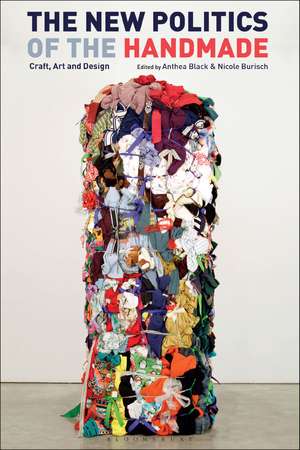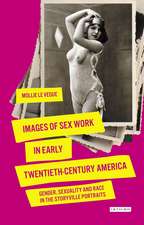The New Politics of the Handmade: Craft, Art and Design
Editat de Anthea Black, Nicole Burischen Limba Engleză Hardback – 23 dec 2020
| Toate formatele și edițiile | Preț | Express |
|---|---|---|
| Paperback (1) | 163.45 lei 3-5 săpt. | +22.28 lei 6-10 zile |
| Bloomsbury Publishing – 23 dec 2020 | 163.45 lei 3-5 săpt. | +22.28 lei 6-10 zile |
| Hardback (1) | 470.61 lei 6-8 săpt. | |
| Bloomsbury Publishing – 23 dec 2020 | 470.61 lei 6-8 săpt. |
Preț: 470.61 lei
Preț vechi: 578.40 lei
-19% Nou
Puncte Express: 706
Preț estimativ în valută:
90.05€ • 98.12$ • 75.88£
90.05€ • 98.12$ • 75.88£
Carte tipărită la comandă
Livrare economică 23 aprilie-07 mai
Preluare comenzi: 021 569.72.76
Specificații
ISBN-13: 9781788316552
ISBN-10: 178831655X
Pagini: 304
Ilustrații: 70 bw illus
Dimensiuni: 156 x 234 x 19 mm
Greutate: 0.66 kg
Editura: Bloomsbury Publishing
Colecția Bloomsbury Visual Arts
Locul publicării:London, United Kingdom
ISBN-10: 178831655X
Pagini: 304
Ilustrații: 70 bw illus
Dimensiuni: 156 x 234 x 19 mm
Greutate: 0.66 kg
Editura: Bloomsbury Publishing
Colecția Bloomsbury Visual Arts
Locul publicării:London, United Kingdom
Caracteristici
Craft activism and indie crafting are an important element within 'the Resistance' as witnessed in the Women's March, direct action on the climate crisis and other contemporary political movements
Notă biografică
Anthea Black is a Canadian artist, writer, and Assistant Professor in Printmedia and Graduate Fine Arts at the California College of the Arts. Her writing on contemporary art, craft and performance appears in The Craft Reader, Extra/ordinary: Craft and Contemporary Art, Making Otherwise: Craft and Material Fluency in Contemporary Art, and Rita McKeough: WORKS. She is the co-editor of HANDBOOK: Supporting Queer and Trans Students in Art and Design Education and co-publisher of The HIV Howler: Transmitting Art and Activism. Black has exhibited work in Canada, the United States, Norway, and The Netherlands, and curated Super String, No Place: Queer Geographies on Screen and PLEASURE CRAFT.Nicole Burisch is a Canadian critic and curator. She is based in Ottawa, where she is Assistant Curator, Contemporary Art at the National Gallery of Canada. Her writings have been published in The Craft Reader and Utopic Impulses: Essays in Contemporary Ceramics, and periodicals including the Cahiers métiers d'art :: Craft Journal, and Textile: The Journal of Cloth and Culture. She was Managing Editor for Desire/Change: Contemporary Feminist Art in Canada, published by Mentoring Artists for Women's Art. She has worked with organizations such as Centre des arts actuels Skol and M:ST Performative Art Festival, and was a 2014-2016 Core Fellow Critic-in-Residence with the Museum of Fine Arts, Houston.
Cuprins
List of illustrationsAcknowledgementsContributorsIntroduction, Anthea Black (California College of the Arts, USA) and Nicole Burisch (National Gallery of Canada) 1. From Craftivism to Craftwashing, Anthea Black (California College of the Arts, USA) and Nicole Burisch (National Gallery of Canada)2. Ethical Fashion, Craft and the New Spirit of Global Capitalism, Elke Gaugele (Academy of Fine Arts Vienna, Austria)3. Selven O'Keef Jarmon: Beading Across Geographies, Nicole Burisch (National Gallery of Canada)4. The Making of Many Hands: Artisanal Production and Neighborhood Redevelopment in Contemporary Socially Engaged Art, Noni Brynjolson (University of Indianapolis, USA)5. That Looks Like Work: The Total Aesthetics of Handcraft, Shannon R. Stratton (Ox-Bow School of Art and Artists Residency, USA)6. Craft as Property as Liberalism as Problem, Leopold Kowolik (Sheridan College and York University, Canada)7. Zahner Metals: Architectural Fabrication and Craft Labour, Peggy Deamer (Yale University and Deamer Studio, USA)8. Capitalising on Community: The Makerspace Phenomenon, Diana Sherlock (Alberta University of the Arts, Canada)9. Morehshin Allahyari: On Material Speculation, Alexis Anais Avedisian (NYC Media Lab, USA) and Anna Khachiyan (independent, USA)10. From Molten Plastic to Polished Mahogany: Bricolage and Scarcity in 1990s Cuban Art, Blanca Serrano Ortiz De Solórzano (Institute for Studies on Latin American Art, USA)11. Things Needed Made, Nasrin Himada (independent scholar, Canada)12. Secret Stash: Textiles, Hoarding, Collecting, Accumulation and Craft, Kirsty Robertson (Western University, Canada)13. Shinique Smith: Lines that Bind, Julia Bryan-Wilson (University of California, USA)14. Margarita Cabrera: Landscapes of Nepantla, Laura August (independent scholar, Guatemala/USA)15. The Sovereign Stitch: Re-reading Embroidery as a Critical Feminist-Decolonial Text, Ellyn Walker (Queen's University, Canada)16. Ursula Johnson: Weaving Histories and Netukulimk in L'nuwelti'k (We Are Indian) and Other Works, Heather Anderson (Carleton University Art Gallery, Canada)17. 'The Black Craftsman Situation': A Critical Conversation about Race and CraftSonya Clark (Amherst College, USA), Wesley Clark (artist, USA), Bibiana Obler (George Washington University, USA), Mary Savig (Renwick Gallery, Smithsonian American Art Museum, USA), Joyce J. Scott (artist, USA) and Namita Gupta Wiggers (Warren Wilson College, USA)Index
Recenzii
While an anthology can do little more than introduce topics and provide roadmaps for further exploration, The New Politics of the Handmade does this well, covering not only current research but also providing copious notes, a helpful index and numerous colour illustrations. This is a volume to keep, and an offering that makes me hope for more to follow.
This exciting new anthology is an engaged and comprehensive overview of the political and ethical debates of contemporary craft and its pervasive social commitments.
The New Politics of the Handmade jumpstarts a sorely needed discussion about the unexamined claims that surround craft as a progressive political movement, a form of anti-capitalist consumption, and a sustainable practice. In this volume Anthea Black and Nicole Burisch have orchestrated an insightful conversation with a diverse group of scholars, artists, and curators about the role and power of craft in the contemporary art world that charts a more nuanced way forward.
The New Politics of the Handmade is a timely volume for craft studies that scrutinises the terms 'craft' and 'handmade,' both their problematic appropriation by consumer capitalism and their continued relevance as a byword for activism and social justice. From the off the book takes issue with craft's beneficent, comforting image that is shown to be susceptible to the affirmatory cultures of neo-liberal individualism. Essays explore craft's relationship to decoloniality, indigeniety, counter-hegemonic practices, feminism, pluralism, global exchange and identity, through an astute focus on specific craft processes and objects. It is an important text for the growing scholarly interest in craft.
In their analyses of maquiladoras and makerspaces, Netukulimk and studio craft, the 'artisanal' and the 'craftwashed,' the artists, authors, and politically-charged perspectives that Anthea Black and Nicole Burisch have deftly woven into this collection break new paths for contemporary craft studies. Absolutely essential reading for those keeping up with this field's rapidly-expanding discourse.
Nicole Burisch and Anthea Black have assembled an impressive group of established and emerging writers, curators, and makers to consider craft politics in all of its complexity. At once proposing craft as a response to urgent social and political issues spanning the globe while also critiquing it for being complicit in late capitalism. The breadth of approaches and understandings of craft in this volume showcase how its fluidity may be productive, from the perspectives of design, museum, fashion, architecture studies and importantly through a decolonial and critical race lens. Craft here is found within familiar places and spaces while also sought out in unexpected ones, from prisons to protests, take-away counters to factories. Interspersing thought provoking artist profiles with essays, The New Politics of the Handmade expands into the political, economic, environmental and social realms through craft in substantive ways, making it an important contribution to scholarship.
This exciting new anthology is an engaged and comprehensive overview of the political and ethical debates of contemporary craft and its pervasive social commitments.
The New Politics of the Handmade jumpstarts a sorely needed discussion about the unexamined claims that surround craft as a progressive political movement, a form of anti-capitalist consumption, and a sustainable practice. In this volume Anthea Black and Nicole Burisch have orchestrated an insightful conversation with a diverse group of scholars, artists, and curators about the role and power of craft in the contemporary art world that charts a more nuanced way forward.
The New Politics of the Handmade is a timely volume for craft studies that scrutinises the terms 'craft' and 'handmade,' both their problematic appropriation by consumer capitalism and their continued relevance as a byword for activism and social justice. From the off the book takes issue with craft's beneficent, comforting image that is shown to be susceptible to the affirmatory cultures of neo-liberal individualism. Essays explore craft's relationship to decoloniality, indigeniety, counter-hegemonic practices, feminism, pluralism, global exchange and identity, through an astute focus on specific craft processes and objects. It is an important text for the growing scholarly interest in craft.
In their analyses of maquiladoras and makerspaces, Netukulimk and studio craft, the 'artisanal' and the 'craftwashed,' the artists, authors, and politically-charged perspectives that Anthea Black and Nicole Burisch have deftly woven into this collection break new paths for contemporary craft studies. Absolutely essential reading for those keeping up with this field's rapidly-expanding discourse.
Nicole Burisch and Anthea Black have assembled an impressive group of established and emerging writers, curators, and makers to consider craft politics in all of its complexity. At once proposing craft as a response to urgent social and political issues spanning the globe while also critiquing it for being complicit in late capitalism. The breadth of approaches and understandings of craft in this volume showcase how its fluidity may be productive, from the perspectives of design, museum, fashion, architecture studies and importantly through a decolonial and critical race lens. Craft here is found within familiar places and spaces while also sought out in unexpected ones, from prisons to protests, take-away counters to factories. Interspersing thought provoking artist profiles with essays, The New Politics of the Handmade expands into the political, economic, environmental and social realms through craft in substantive ways, making it an important contribution to scholarship.

